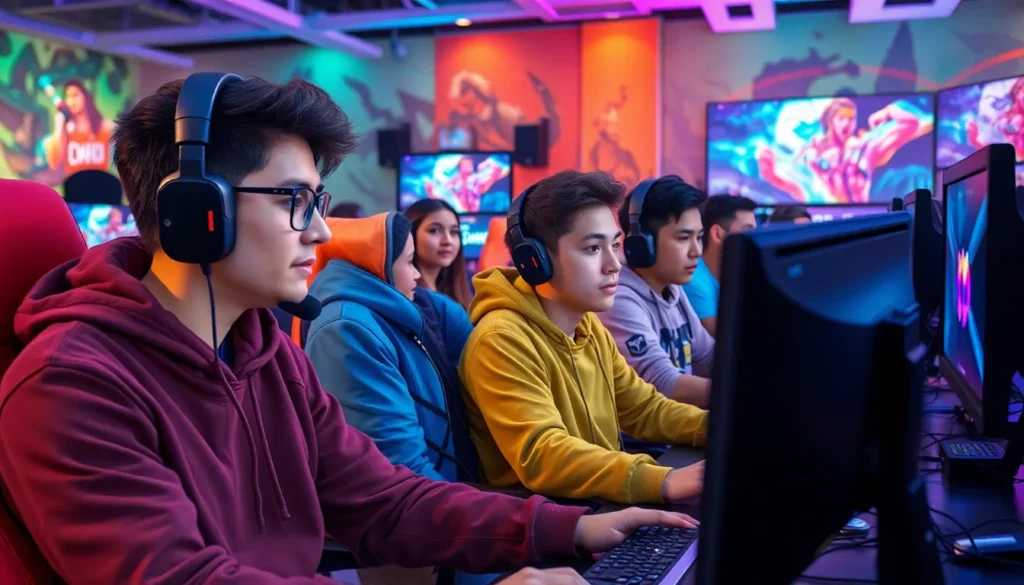In a world where gaming isn’t just a pastime but a passion, esports clubs have become the ultimate playground for competitive spirits. Picture this: a group of friends, snacks in hand, battling it out in epic showdowns while forming bonds that rival even the strongest guilds. Esports clubs offer more than just a chance to level up skills; they create a community where players share strategies, celebrate victories, and laugh over defeats.
Esports Club
Esports clubs are organized groups where gamers unite to engage in competitive play. They cater to individuals with diverse skill sets, from novices to experienced players. In these clubs, members practice together, honing their techniques and strategies in various games.
Many clubs focus on community building, creating an environment that fosters friendships among members. Players often celebrate achievements together, reinforcing bonds while sharing experiences, both wins and losses. This camaraderie enhances the club experience, cultivating a sense of belonging.
Additionally, esports clubs offer opportunities for skill development. Regular practice sessions and friendly competitions help members improve their gameplay. Guidance from more experienced players often occurs, facilitating personal growth and mastery of games.
Some clubs participate in local and national tournaments, pushing members to showcase their skills. Competing in these events not only provides valuable experience but also exposes players to broader gaming communities. Engaging in tournaments can enhance reputation and recognition within the esports landscape.
Furthermore, esports clubs often collaborate with educational institutions. These partnerships can provide resources, training, and even scholarships for talented players. Such arrangements strengthen the connection between academics and esports, promoting a positive outlook on gaming as a viable career path.
Esports clubs serve as vital hubs where passion for gaming meets community and competition. They support player development, foster friendships, and elevate the overall gaming experience.
Benefits of Joining an Esports Club

Joining an esports club offers numerous advantages that enhance both gameplay and community engagement. Players gain valuable skills while building lasting connections with fellow gamers.
Skill Development
Skill development represents a core benefit of esports clubs. Members practice regularly, refining their techniques in various games. Through friendly competitions, they test strategies against opponents, fostering growth. Coaches and experienced players often provide personalized coaching, which maximizes individual potential. Regular feedback during practice sessions promotes continuous improvement. Each player learns new skills tailored to their experience level, ensuring an effective learning environment. By collaborating in team settings, individuals enhance teamwork and communication abilities central to esports success.
Social Interaction
Social interaction thrives in esports clubs, creating a welcoming atmosphere for players. Members form friendships that extend beyond gaming sessions, often sharing interests in entertainment and technology. Regular meetings and events foster camaraderie, encouraging a sense of belonging. Members celebrate victories and support one another during losses, reinforcing bonds of friendship. Networking opportunities arise through tournaments and community events, connecting players within the broader gaming landscape. Creating these relationships leads to increased motivation and engagement, which positively impacts overall performance. Social experiences enrich the gaming journey, turning solitary play into a collaborative adventure.
How to Start an Esports Club
Starting an esports club involves careful planning and organization. Each step contributes to building a successful community of gamers.
Defining Your Club’s Vision
Defining a clear vision serves as the foundation for the esports club. Members should identify the goals, such as fostering competition, building community, or promoting skill development. Creating a mission statement helps clarify these objectives and attracts like-minded individuals. Establish club values that reflect the spirit of gaming and respect among players. Ensuring everyone understands this vision fosters unity and builds a strong sense of purpose, which is critical for long-term success.
Recruiting Members
Recruiting members starts with creating an inviting atmosphere. Utilizing social media platforms is effective for reaching potential players. Hosting open gaming sessions offers a chance for newcomers to experience the club firsthand. Establishing a presence at local gaming events can generate interest and attract diverse talent. Encouraging word-of-mouth promotion amplifies recruitment efforts. Collecting contact information for interested players helps maintain ongoing communication, ensuring they stay informed about club activities and events. This proactive approach facilitates a steady flow of new members, enhancing the club’s growth and vibrancy.
Popular Esports Games in Clubs
Esports clubs often embrace a variety of games that cater to diverse interests and player skills. League of Legends remains a top choice, attracting millions with its strategic gameplay and team-based mechanics. Players enjoy mastering champions and developing strategies to outsmart opponents.
Another staple is Dota 2, known for its complexity and competitive scene. Clubs frequently organize practice matches where members work on team coordination and hero selection strategies. Call of Duty captivates first-person shooter enthusiasts, combining fast-paced action with tactical gameplay, making it a popular choice for clubs.
Valorant has rapidly gained popularity since its release, drawing in teams eager to test their skills in this tactical FPS. Esports clubs often host tournaments to engage players in friendly competition, promoting community interaction.
Counter-Strike: Global Offensive stands out among first-person shooters due to its deep strategy and teamwork requirements, and clubs frequently focus on map strategies and weapon handling techniques. Rainbow Six Siege emphasizes tactics and coordination, appealing to clubs seeking to cultivate communication skills.
Fortnite remains a cultural phenomenon with its vibrant graphics and building mechanics, making it ideal for clubs with a younger demographic. Minecraft, while not a traditional esports title, attracts clubs interested in creative, community-driven competitions and events.
Clubs also explore fighting games like Super Smash Bros. Ultimate, fostering a competitive yet friendly atmosphere for casual and serious players alike. Each game contributes to the overall growth and engagement within the esports community, ensuring members continually hone their skills and enjoy the camaraderie that comes with shared passions.
Strategies for Success in an Esports Club
Creating a successful esports club involves defined strategies. Establishing a strong club identity enhances member engagement. Developing a clear vision motivates players and encourages a sense of purpose.
Scheduling regular practice sessions is vital. Players improve their skills significantly through structured training. Teams can participate in internal competitions to promote healthy competition among members.
Fostering communication between members enhances collaboration. Utilizing platforms like Discord or other social media allows for real-time interaction and feedback. Encouraging members to share strategies and tips facilitates skill improvement.
Members should participate in local and national tournaments. Competing outside the club provides exposure to diverse playing styles and experiences. Success in tournaments boosts team morale and attracts new members.
Supporting team dynamics is essential. Building a culture of respect and teamwork helps create a supportive environment. Regular team-building activities strengthen relationships and improve cooperation during gameplay.
Investing in quality coaching materials and resources contributes to player development. Members can access tutorials, strategy guides, and analysis of professional matches. These resources support learning and enhance game strategies.
Celebrating achievements and progress keeps motivation high. Acknowledging both individual and team accomplishments fosters a sense of belonging. Recognition of effort, regardless of outcomes, maintains enthusiasm among players.
Incorporating feedback from members shapes the club’s direction. Understanding member expectations leads to continual improvement. Adapting strategies based on input ensures the club evolves with its players’ needs.
Overall, implementing these strategies strengthens an esports club’s foundation. High engagement rates lead to a thriving gaming community. A focused approach toward skill development and relationship-building enhances both individual and collective success.
Conclusion
Esports clubs are more than just a gathering of gamers; they’re dynamic environments that nurture talent and foster community. By providing a space for practice and competition, these clubs empower players to grow individually and collectively. The bonds formed through shared experiences create lasting friendships and support networks that extend beyond the games.
As esports continues to evolve, the role of these clubs will only become more significant. They pave the way for aspiring players to connect with mentors and peers while exploring opportunities in the gaming industry. With careful planning and a clear vision, anyone can start an esports club that thrives on passion and teamwork, contributing to the vibrant landscape of competitive gaming.


More Stories
Esports Arena Las Vegas: The Ultimate Gaming Hub You Can’t Miss
Esports Degree: Unlock Exciting Career Opportunities in the Booming Gaming Industry
NACE Esports: Unlock Scholarships and Careers in Competitive Gaming